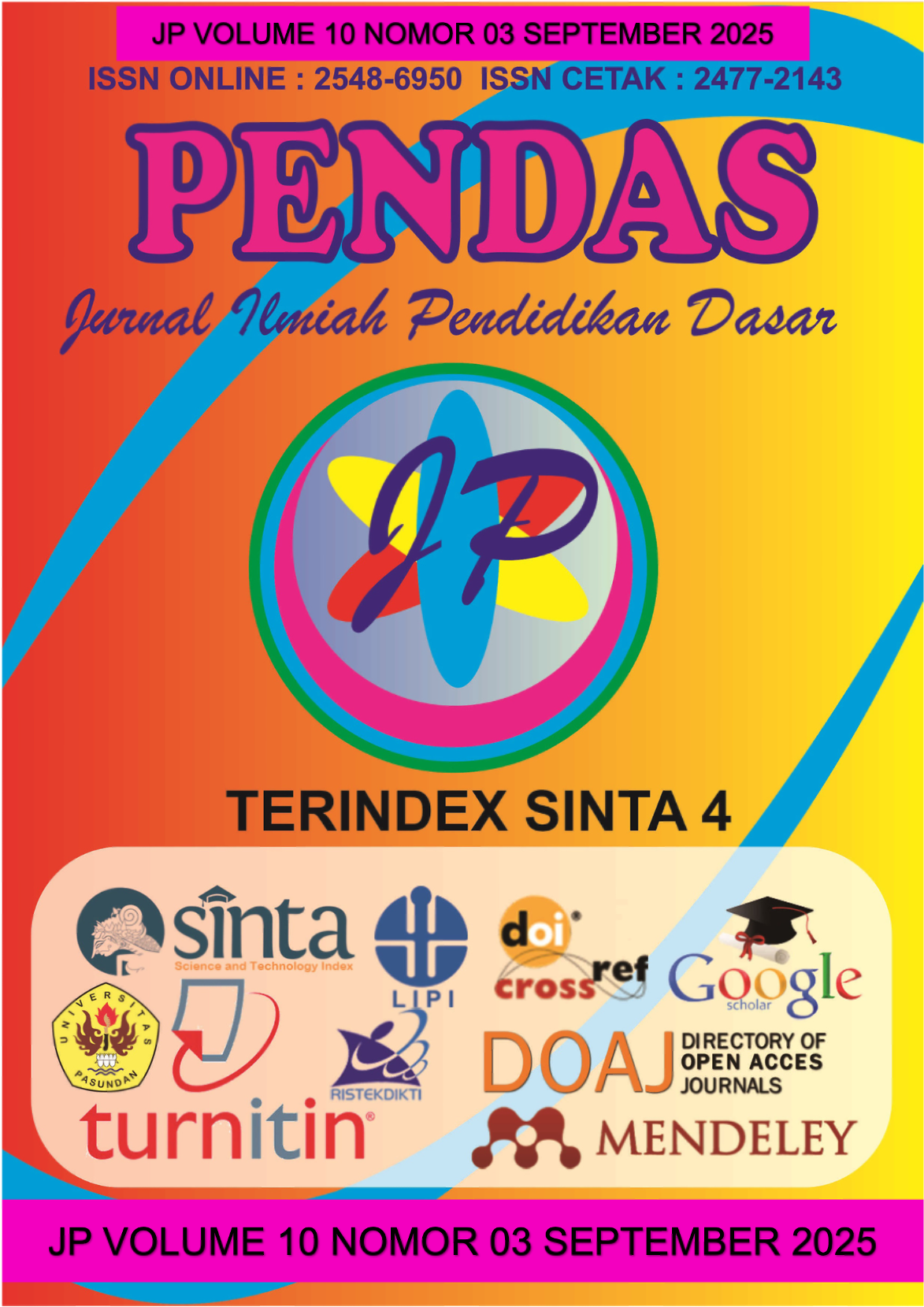ANALISIS KESULITAN BELAJAR MATEMATIKA OPERASI HITUNG PERKALIAN SISWA KELAS IV SD NEGERI 4 PULAU RIMAU
DOI:
https://doi.org/10.23969/jp.v10i03.31721Keywords:
Learning difficulties, Computational Operations, Multiplication MathematicsAbstract
The purpose of this study was to describe the difficulties in learning mathematics
of multiplication operations of fourth grade students of SD Negeri 4 Pulau Rimau.
This study used qualitative methods using a descriptive approach. Data collection
techniques in this study were interviews and documentation. The data analysis
technique used was according to Miles and Huberman. The results of the study
based on the results of interviews and documentation that had been carried out
showed that the difficulties in learning mathematics of multiplication operations of
fourth grade students of SD Negeri 4 Pulau Rimau were: these difficulties include
errors in using the concept of multiplication, lack of multiplication skills (operating)
especially in tens and tens numbers, the influence of deskmates which causes
students to have difficulty focusing, often being invited to chat and, their memory is
not lacking, low interest in learning students because they are often considered
difficult and many students do not pay attention (focus) when the teacher explains
the material in front of the class, parents of students who do not accompany their
children when studying at home because they are busy working and taking care of
homework, and errors in understanding problems such as story problems because
they are too long and not directly to the point which causes students to be lazy to
read so that many students do not get the correct answers.
Downloads
References
ri, Wibowo, D. C., & Agia, Y.
(2020). Analisis Kesulitan
Belajar Matematika Kelas V
SD Negeri 25 Rajang
Begantung II. J-PiMat: Jurnal
Pendidikan Matematika, 2(2),
231-241.
Anggraeni, S. T., Muryaningsih, S., &
Ernawati, A. (2020). Analisis
Faktor Penyebab Kesulitan
Belajar Matematika Di Sekolah
Dasar. JRPD : Jurnal Riset
Pendidikan Dasar, 1(1), 25-37.
Anitra, R. (2021). Pembelajaran
Kooperatif Tipe Jigsaw dalam
Pembelajaran Matematika di
Sekolah Dasar. Jurnal
Pendidikan Dasar Indonesia,
6(1), 8-12.
Arham, H. R., & Adirakasiwi, A. G.
(2022). Analisis Kemampuan
Pemahaman Matematis Siswa
dalam Menyelesaikan Soal
Matematika Dasar. Jurnal
Didactial Mathematics, 4(2),
314-322.
Arifin, M. (2020). Kesulitan Belajar
Siswa dan Penanganannya
pada Pembelajaran
Matematika SD/MI. Jurnal
Inovasi Penelitian, 1(5), 989-
1000.
Bunyamin. (2021). Belajar dan
Pembelajaran. Jakarta: Upt
Uhamka Press.
Cahyadi, F., Wahyuningrum, & Dewi
S, A. C. (2021). Analisis
Kesulitan Belajar Siswa Dalam
Pemecahan Masalah
Matematika Materi Operasi
Hitung Perkalian dan
Pembagian Kelas III B SD
Negeri Bandungrejo 01
Demak. Dwijaloka Jurnal
Pendidikan Dasar dan
Menengah, 2(3), 275-278.
Damayanti, R., & Ain, S. Q. (2023).
Analisis Kesulitan Belajar
Matematika Pada Materi
Operasi Hitung Perkalian dan
Pembagian Siswa Kelas IV
SDN 193 Pekanbaru. Jurnal
Penelitian Ilmu Pendidikan
Indonesia, 2(4), 464-470.
Dewi, N. R., & Ardiansyah, A. S.
(2022). Proses dan Dasar
Pembelajaran Matematika.
Klaten: Lakeisha.
Djamaluddin, A., & Wardana. (2019).
Belajar dan Pembelajaran.
Parepare: CV. Kaafah
Learning Center.
Dwi, D. F., & Audina, R. (2021).
Analisis Faktor Penyebab
Kesulitan Belajar Matematika
Kelas IV Sekolah Dasar
Negeri. Journal Education
Research and Social Studies.,
2(3), 94-106.
Dwiyono, Y., & Tasik, H. K. (2021).
Analisis Kesulitan Belajar
Operasi Hitung Perkalian
Matematika Siswa Kelas IV SD
Negeri 019 Samarinda Ulu.
Jurnal Ilmu Pendidikan LPMP
Kalimantan Timur, Edisi
Khusus(1), 175-190.
Guntur, M., & Robyyani, L. (2021).
Penggunaan Metode
Permainan untuk
Meningkatkan Kemampuan
Siswa dalam Operasi Hitung
Perkalian. Jurnal Sains dan
Ilmu Pendidikan, 2(2), 56-63.
Gusteti, M. U., & Neviyarni. (2022).
Pembelajaran Berdiferensiasi
Pada Pembelajaran
Matematika Di Kurikulum
Downloads
Published
Issue
Section
License
Copyright (c) 2025 Pendas : Jurnal Ilmiah Pendidikan Dasar

This work is licensed under a Creative Commons Attribution 4.0 International License.














































